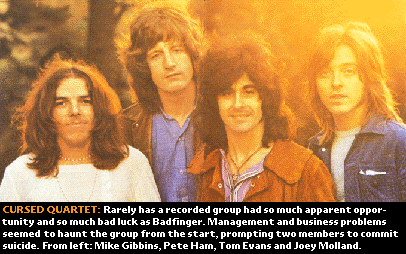|
"Day After Day" Badfinger Apple 1841 Dec. 1971 Billboard: #4
The story of Badfinger is one of the saddest and most unfair tales in rock and roll. Other artists may have struggled, been ripped off, suffered needless pain, and gone unrecognized for their talents, but rarely did one artist (or group) have to withstand all of this at the same time. When the Beatles brought Badfinger into the fold, it seemed like a dream come true. Just as they were getting themselves off the ground, however, their dream was transformed into a nightmare. Apple Corp., the business the Beatles began to held struggling artists, began to strangle them instead. The Beatles' finances were a complete disaster, and Badfinger had the horrible misfortune of being contractually bound to the company at the worst possible time. Even the Beatles lost any semblance of control over the situation, with various lawyers and accountants attempting to discern who owed what to whom. Under these circumstances, Badfinger had little choice and no power to enact a change.
Financially abandoned and with little money to promote their records, let alone record them, Badfinger languished. They strained to pull the plug that attached them to Apple, but when they finally did, they lost any connection to the material they had recorded there. Because of the litigation, many of the label's assets were placed in receivership, and Badfinger's catalog was considered to be a particularly valuable asset. As a (stupendously stupid) result, the lawyers bit the hand that was feeding them. By freezing Badfinger's material, they effectively crushed the band's ability to generate income, for themselves or their label. Badfinger's entire catalog was no longer in print, and Apple Records was no more. Ostracized from their best material (and, just as painfully, from their allotted royalties), the group suffered an almost immediate financial burden. Worse, with no records in the stores, no contemporary airplay, no advertising, no touring, no label affiliation, and no income, in the public's eye they ceased to exist. Ouch. An almost equally humiliating affiliation with Warner Brothers didn't help matters. Warner had advanced the band money for touring and recording, but somehow it disappeared. The band's management remained deathly quiet about the incident, so Warner sued them and immediately withdrew the group's latest release, Wish You Were Here. The plug was pulled even as the band was touring to promote the album, which happened to be their best record in years. Understandably, bandmember Joey Molland grew disenchanted and quit. By 1975, Ham had become deeply depressed over the apparent hopelessness of his situation. On April 23, he was found hanged. The remaining members split up, but not for good. If possible to imagine, the new entity became even more obscure, and the bad luck continued. By 1983, they had gone absolutely nowhere and had degenerated into little more than a footnote in music history books. Meanwhile, their songwriting royalties were still being withheld, and their hit catalog was still out of print. For nearly two full decades, their best material languished. Their albums and hit singles were available only as collector's items; a hit single like "Day After Day" could fetch as much as $25 while the album Straight Up could be sold for $50 if it was in pristine condition. Of course, the band saw none of this money. Evans, the man who cowrote "Without You" with Ham, also abandoned all hope and committed suicide on Nov. 23, 1983, under circumstances chillingly similar to his songwriting partner's. Drummer Mike Gibbins died of unknown causes at age 56 at his Oviedo, Florida, home on Oct. 4, 2005. - Thomas Ryan, American Hit Radio, Prima Entertainment, 1996.
No comments so far, be the first to comment. |


